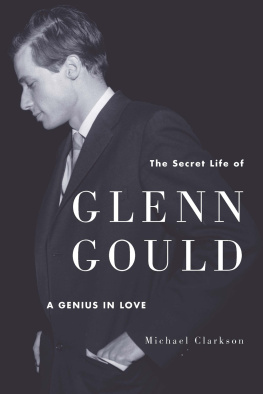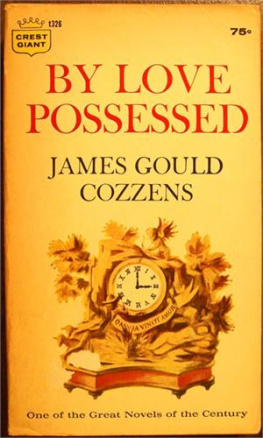To Jennifer (Vanderklei) Clarkson,
the virtuoso in my life
We both fell in love talking about tranquility of spirit and we re-enforced each others determination to find that quality and bring it into our lives.
Glenn Gould, writing about a woman two years before he died
INTRODUCTION
The slow, impending death of a great entertainer. Its rare that we could actually see such a thing, but there it is, in Glenn Goulds legendary 1981 performance of Bachs Goldberg Variations. Fans have watched the video for decades as if it were his epitaph.
And, in a way, an epitaph is what it turned out to be.
As the camera slowly zooms in on the solitary pianist, at first we see Gould with his head all but buried in his Steinway, hunched over and getting as close to the keyboard as possible, an old man shriveling before our eyes. It is difficult to distinguish what is more compelling the stark visual of the man or his melancholic music, slow and contemplative, surely a reflection, an outpouring of his troubled soul, a lonely artist losing control of his environment. He looks ill, as though he has taken a pounding, physically and emotionally, as though life should not have required five decades to bring him to his knees. Wearing heavy-rimmed glasses, he could be blind. And yet there is poetry to this scene a bittersweet self-consciousness as Gould chatters and sings quietly to himself. Tender and loving is the voice from his piano. The video ends with Gould dramatically dropping his hands and, finally, his weary head. Arguably the greatest piano virtuoso of his time was expiring. And, in ways, these Goldberg Variations a beautifully complex score written by Johann Sebastian Bach reportedly as a charming sleeping pill in 1740 to please an insomniac Russian count helped put Glenn Gould, age fifty, to sleep. Within seventeen months of this recording, he was dead and the album was released posthumously to rave reviews, winning a Grammy award.
History tells us that Gould died from a stroke and a blood clot, possibly because his immune system had been weakened through prescription drug abuse and an unhealthy lifestyle, and more than forty books and twenty documentaries by or about Gould would seem to back this conclusion. But now, nearly three decades later, we discover through this book perhaps another important cause of his demise heartsickness.
In his last seven years, Gould suffered an unprecedented string of heartbreaks with women, beginning with the death of his mother, Flora, in 1975 , and reportedly ending with a marriage rejection from Birgit Johansson, a piano teacher in Stockholm, several days before his stroke. Oh why couldnt I have given him the time? Was it because of me he died? the charismatic Johansson told relatives. Why didnt I do more for him?
Sandwiched between the loss of Goulds two beloved piano teachers were the collapse of his ten-year affair with Cornelia Foss, the wife of famous composer Lukas Foss, and two shadowy relationships which ended mysteriously with soprano Roxolana Roslak and pianist Monica Gaylord. Dont tell anybody about me and Glenn, Gaylord told Goulds assistant at his funeral.
Many of these relationships were painful enough for the sensitive Gould, but perhaps even more so because he kept them secret. He confided in no one when they fell apart, often due to his own emotional shortcomings and personal demands.
Gould, who told friends he would not live past fifty, may have known what was coming. Some evidence of this is seen in the two recordings of his signature Goldberg Variations. In the twenty-six years between those records, released in 1956 and 1982 , something happened to Gould, and even he saw it. In the early 1980 s, while reviewing his initial recording, Gould remarked, I could not recognize, or identify with, the spirit of the person who made that recording. It really seemed like some other person, some other spirit had been involved. In this statement, Gould seemed to be admitting what many people thought impossible that Gould had matured, had been swayed by his life experiences and by the outside world to the point his spirit had changed. There is additional video evidence to support the changes in the two Gould-berg signatures. A 1964 film shows a spritely Gould as a hip artist on a more passionate, hopeful mission a man in a hurry to get somewhere. Perhaps what helped to change Gould through the years was the ebb and flow of his personal life, the bumps and the bruises of his romances with Foss, Roslak and Johansson, and with piano instructor Franny Batchen in the 1950 s. The turmoil in those relationships was something that perhaps affected his music as well. And yet, Goulds clandestine, somewhat eccentric romances were not all sad songs. They seemed to enrich his life and his art in positive ways, giving to both deeper meaning, spiced with emotions he reluctantly was forced to acknowledge.
Meanwhile, long after his death, Gould still lures new listeners to his piano, connecting with them on a haunting, personal level. He feels and you feel, says New York writer Nicole Audrey. I can feel his pain and joy it touches me. He speaks directly to me. But during his career, just who was Gould playing for? His audience? Himself? His demanding mother? All are likely true, but he was also richly inspired by and bared his soul at the keyboard to a secret society of women, the girlfriends who stirred his hard-to-fetch feelings, compelled him to propose marriage and acted as sounding boards and motivators for his unforgettable interpretations of the classics and his own compositions. They were the voices, the silent chorus behind the solitary genius.
Fast-forward to a snowy, warm-as-toast-in-your-parka kind of December day in 2006 , the sort of day that Glenn Gould would have adored, when the first seed for this book was planted. My granddaughter, Skye, and I tossed crumbs on the frozen ground to pigeons in a small park in midtown Toronto. She looked up innocently at a sign that read: GLENN GOULD PARK .
Who was he, Papa? she asked.
He was a famous pianist from years ago.
Who was he, Papa? Skye repeated.
Beyond his famous music, I knew that some of Goulds appeal was his eccentricity and the mystery surrounding his private life, that he supposedly gave up his earthly pleasures for his art as a monk might do, but I suspected there was more to his story. An inquisitive writer/researcher for four decades, I was not satisfied with the answer I had given my granddaughter and I decided to find out more. My timing was good when I discovered that 2007 was the twenty-fifth anniversary of Goulds death and seventy-fifth anniversary of his birth I decided to write a freelance feature story about Gould for the Toronto Star. My initial research revealed a wide-held clich: a man who bared his soul at the piano stool, touching everyone who heard him play, but the rest of the time protected himself in a cocoon of hats and overcoats. Gould was uncomfortable with people touching his skin, perhaps affected by Aspergers Syndrome, a variant of autism, which can make a person shy a control freak who could not live without a structured, solitary life. Of the books and documentaries about Gould, each has added its piece to the puzzle, mostly regarding the musical enigma and his phobias, but I do not think they tell us enough about the man, the spiritual, emotional and romantic soul, who was one of the greatest Canadians of all time. We still do not really know what made him tick or why he appeals to us, his millions of listeners. His music moves people and they want to know more about what made him so sensitive, about his heart, and if in ways he was like them.
More than a quarter century after his death, Goulds sexuality remains largely a mystery to his fans who still wonder about him on Internet blogs. Never during his lifetime was Gould publicly linked to a woman. He never married and usually cut people off if they talked about his private life. This led people to assume he had something to hide and was gay or bisexual. It is interesting to note that, while previous biographers have been timid about touching upon Goulds romantic life, they forged ahead with other embarrassing details about his health, habits and psyche.
Next page





